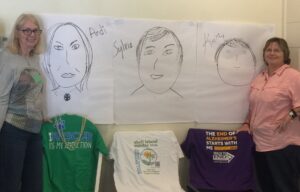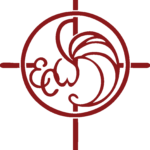 by Nancy Young, National President, The Episcopal Community
by Nancy Young, National President, The Episcopal Community
How can we be there when we can’t be there? This is a question that religious groups throughout the church are having to answer during this COVID-19 pandemic. At a time when we must practice social distancing, a time we cannot travel, a time of isolation, we face two primary challenges:
- How do we support each other in this time of separation, turmoil, and grief?
- How do we carry on the mission and business of our group?
This is not a new question for The Episcopal Community. The group was formed in 2010 during a time of change and turmoil within the national church—the ordination of women, the consecration of a gay bishop, disputes over church property and the formation of breakaway congregations. In 2010, as snow fell softly outside the large glass windows of St. Mary’s Chapel of St. Philip’s Cathedral in Atlanta, Ga., a group of women pledged to form a new women’s organization within the Episcopal Church—a vowed community anchored in the Baptismal Covenant and Rule of St. Benedict, a community that would support its members in deepening their spiritual lives as they gave prayerful support to their Episcopal clergy, parishes, dioceses, and the national church.
The 40-plus women gathered that day were from all over the country. Although united by a common desire to live a life “Marked as Christ’s Own for Ever,” how could a group so geographically separated live as a community?
The first step was to select a common foundational study and to create connections by assigning each prospective member a one-on-one mentor for the study. Mentors were selected from women who were recognized as having gifts in education and/or spiritual formation. The book “St. Benedict’s Toolbox” by Jane Tomaine was selected for the study. Mentors interacted individually and in small groups with prospective members through phone calls, email, snail mail, shared journals and Skype. The use of common study and devotional materials, the provision of mentors and discussion leaders, and the use of electronic communications have been building blocks for The Episcopal Community in being there when you can’t be there.
The lessons learned early in the life of The Community have served us well through the years but have become especially important during this time of social distancing and travel restrictions. How do we ensure the health and safety of our members while simultaneously meeting their needs for community and communal worship?
As members deal with loneliness, anger, fear, grief, economic insecurity and a loss of normalcy, how do we maintain connections, continue our ministry and meet the needs of our members?
Newsletter emails, phone calls and Zoom meetings have been an important way for members to stay connected. A member shared, “the fact you all are there is a comfort.” We have offered Zoom online book discussions so that members can see and hear each other as they share ideas and insights. Our most recent study was “The Gift of Wonder: Creative Practices for Delighting in God” by Christine Aroney-Sine.
Aroney-Sine’s book teaches how through childlike creative play with nature we can delight in God as He delights in us. Although not written with this pandemic time in mind, she suggests activities that can be done alone with the natural environment found in the place we are self-isolating that can make us co-creators in God’s kingdom. Sharing those solitary creative episodes via Zoom and Facebook unites us in community. Another member said, “This gives me a personal connection to those that chose to share pictures of their daily life.” We have also used common devotionals with daily sharing on Facebook to create connections, most recently “The Rule of Benedict: A Spirituality for the 21st Century” by Joan Chittister.
Members are also joined through prayer in several ways: the prayer of the community, the praying of a common monthly prayer cycle, and a prayer list of member personal requests that is circulated electronically to members through both Constant Contact and through our private Facebook group.
The Episcopal Community prayer cycle teaches familiarity with “The Book of Common Prayer” (BCP) and unites us in common prayer. For example, on the 10th day of every month we pray for our parishes, its clergy, staff, lay ministries, and members using the prayers on page 817 of the BCP. On day 27 we pray for our families using the BCP prayers on pages 828 and 831. Members are reminded of the daily prayer target through our Facebook group page and may share comments on the page. Members of the public are invited to join us in prayer through our Facebook group Followers of The Episcopal Community. One of our Facebook followers commented, “It’s a feel-good place to start the day. Each time I stop in I experience an outward and inward spiritualness that lasts all day.” We continually receive uplifting messages: “The daily prayer cycle keeps me focused on more than myself.”
This year we faced a far different Holy Week. Churches were closed to physical attendance of members. Weekly church communal worship and special Holy Week services were disrupted. How could we help meet the need for communal worship?
The Episcopal Community offered Compline each Sunday evening via Zoom video calls led by volunteer members and our national chaplain. Looking into each other’s faces, hearing each other’s voices as we prayed affirmed that we are in this together. We are in this together, and God is with us.
A member in rural Nevada shared in the coffee hour, “Thank you for inviting me to this. I have felt so lonely.” A member in Michigan added, “Sunday evening Compline provides a time to re-center for the evening” and “provides preparation for the coming week.”
The inability to meet in person also affects the conduct of business. Because our membership and our leaders live across the United States, our leadership meetings are held primarily through Zoom. Our annual full membership national meetings, however, are usually in person. In the years of the General Convention of the national church, they are held at the convention where we also provide the Chapel for the convention. This June we were to meet in Atlanta both to celebrate our 10-year anniversary and to fellowship with our members from across the country. With concern for the health and safety of our members and in keeping with the recommendations of the CDC and the national Episcopal Church, we have cancelled our Atlanta meeting. We will meet via Zoom.
The challenges of this pandemic are not over. We must face them with adaptability and innovation. Together we will come through.
Nancy Young
9365 Buckhorn Road
Loveland, CO 80538
(850) 814-6637
youngnf50@gmail.com

